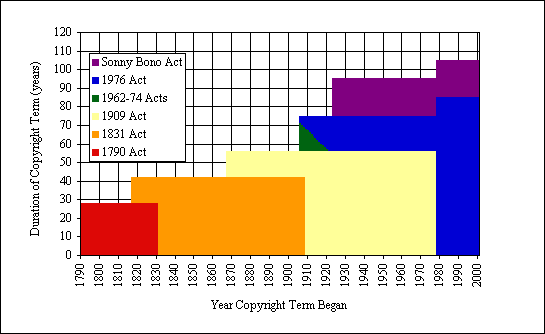
On January 5, 2001 the Creative Commons was founded. The Creative Commons was meant to be a means in which creators could share their works globally while working with or around copyright regulation/restrictions.
The Sonny Bono Copyright Term Extension Act (CTEA), and it was enacted in 1998, this played a pivotal role in the story of how the CC came into existence. This act extended the term of copyright for every work in the United States, including those already published, for an additional 20 years. This meant the copyright term equaled the life of the creator plus 70 years. This move put the U.S. copyright term in line with some other countries, though many more countries remain at 50 years after the creator’s death to this day.
The CTEA was commonly referred to as the Mickey Mouse Protection Act because the extension came just before the original Mickey Mouse cartoon, Steamboat Willie, would have fallen into the public domain.
Copyright extension had been lobbied by Walt Disney Company since 1990. Other corporate entities that lobbied in favor of the Bono Act included: Time Warner, Universal, and Viacom. The major professional sports leagues lobbied in favor as well. They argued that Congress the power to pass whatever copyright term it wants. Money played a role in their argument as they claimed copyrighted works are an important source of income and that media such as VHS, DVD, cable and satellite have increased the value and commercial life of movies and television series.
Opponents of this act argued copyright protection was never meant to be extended in the U.S. Additionally, by extending copyright protection would not be beneficial to the public as intellectual property serves a public purpose. The New York Times argued against this act stating that arguments against public domain make it sound like, "a dark abyss where songs go, never to be heard again. In fact, when a work enters the public domain it means the public can afford to use it freely, to give it new currency."
Another argument against the CTEA is focused on the First Amendment "because of the prospective and retrospective application of the CTEA."

Tom W. Bell, CC BY-SA 3.0, via Wikimedia Commons
In Eldred v. Ashcroft, 537 U.S. 186 (2003), the Supreme Court denied a First Amendment challenge to the Copyright Term Extension Act of 1998 (CTEA).
Here are three quick takeaways from the Supreme Court ruling:
Creative Commons as an organization is an international network that seeks to expand the reach and range of creative works. This is all done with the intent of legal distribution and sharing of these works. In regards to the CC license, that lets people know how the author wants to share rights to work created.
With it's licenses the CC can accomplish their goal of letting creators have control over their work. Using CC licenses provide a standardized way of granting permissions to creative work under copyright law. This standardization makes it possible for people to reuse works and understand the requirements/restrictions, if any, set by the content creator.
This standardization has helped build the Creative Commons platform to over 2billion CC-licensed works.
The Creative Commons offers several ways to get involved . They also list platforms that provide CC-licensed works, this includes the big sites like Youtube and Internet Archive. I would like to add that coding is also a good way to share your work. Codepen.io is part of the Open Source Initiative and contain a network of people sharing their front end coding for others to use, they also provide licening info as well. Github has extensive info on their options for licensing your software as well. Creative Commons has additional info about software and open source code.
The U.S. Copyright Office has a timeline titled A Brief History of Copyright in the United States.
What Is Creative Commons Trying to Resolve
"The Story of Creative Commons / 1.1" https://certificates.creativecommons.org/cccerteducomments/chapter/1-1-the-story-of-creative-commons/ by Creative Commons. CC BY 4.0.
Wikimedia Foundation. (2022, September 18). Creative commons. Wikipedia. Retrieved September 30, 2022, from https://en.wikipedia.org/wiki/Creative_Commons
Fun Fact
"The Story of Creative Commons / 1.1" https://certificates.creativecommons.org/cccerteducomments/chapter/1-1-the-story-of-creative-commons/ by Creative Commons. CC BY 4.0.
Proponents of the CTEA
"The Story of Creative Commons / 1.1" https://certificates.creativecommons.org/cccerteducomments/chapter/1-1-the-story-of-creative-commons/ by Creative Commons. CC BY 4.0.
Opponents of the CTEA
Wikimedia Foundation. (2022, September 5). Copyright term extension act. Wikipedia. Retrieved September 30, 2022, from https://en.wikipedia.org/wiki/Copyright_Term_Extension_Act#Support
Eldred v. Ashcroft
Hull, G. P. (n.d.). Eldred v. Ashcroft. Retrieved September 30, 2022, from https://www.mtsu.edu/first-amendment/article/252/eldred-v-ashcroft
CC and its Licenses
What we do. Creative Commons. (2022, September 9). Retrieved September 30, 2022, from https://creativecommons.org/about/
Wikimedia Foundation. (2022, September 18). Creative commons. Wikipedia. Retrieved September 30, 2022, from https://en.wikipedia.org/wiki/Creative_Commons#CC_license_proliferation

"Creative Commons Timeline" by Todd Jensen is licensed under a Creative Commons Attribution 4.0 International License.
Location
2508 11th Avenue, Kearney, NE 68849-2240
Contact Us
Circulation Desk: 308-865-8599
Main Office: 308-865-8535
UNK © 2024